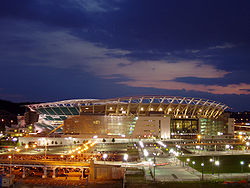
This is a complete list of Cincinnati Bengals head coaches. There have been ten head coaches for the Cincinnati Bengals of the National Football League (NFL). A professional American football team based in Cincinnati, Ohio, the Bengals are a member of the North Division of the American Football Conference (AFC). The Bengals franchise was founded in 1968 as a member of the Western Division of the American Football League (AFL), [1] before merging with the NFL in 1970. [1]
Contents
The current head coach is Zac Taylor, who was hired after the 2018 season. Taylor replaced Marvin Lewis, who remains the Bengals all-time leader in seasons coached, games coached, wins, and playoff games coached. Three coaches have won a conference championship with the team: Forrest Gregg in 1981, Sam Wyche in 1988 and Taylor in 2021. [2] Gregg leads all coaches in winning percentage with .561. [3] Dick LeBeau had the lowest winning percentage, with .267. [4] Of the ten Bengals head coaches, three have been elected to the Pro Football Hall of Fame: Paul Brown, Forrest Gregg, and Dick LeBeau (although only Brown was inducted as a coach, the other two were inducted as players). [5] Two former players have been head coach for the Bengals: Sam Wyche and Bruce Coslet.






